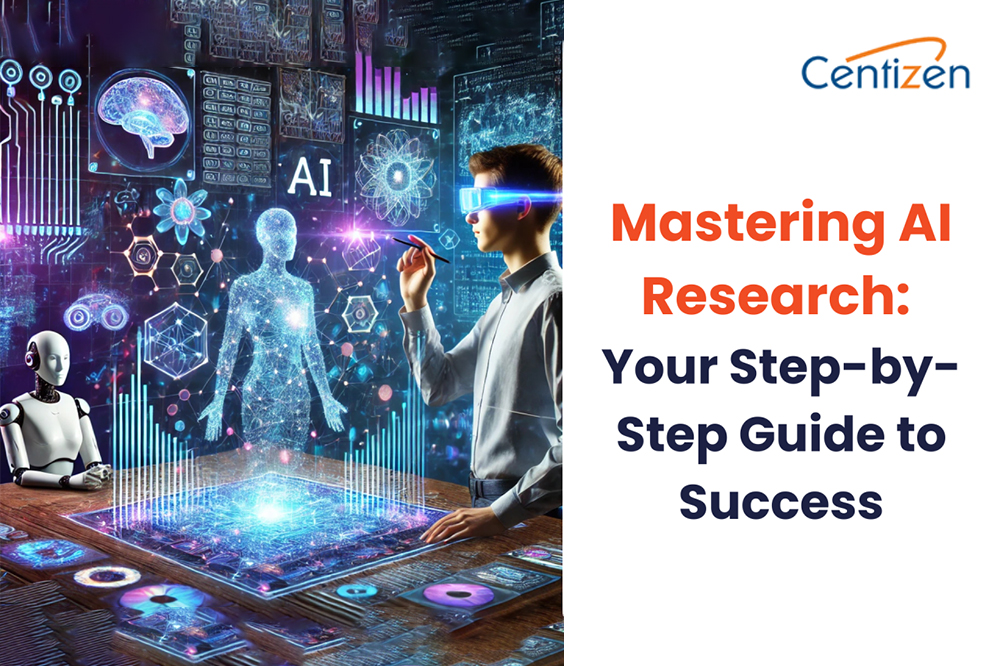Mastering AI Research: Your Step-by-Step Guide to Success

Artificial Intelligence (AI) is shaping the future of technology, and AI researchers are at the forefront of this revolution. Whether you’re a student, a software engineer, or an academic, pursuing AI research can open doors to groundbreaking innovations and career opportunities. But how do you become an AI researcher? Here’s a roadmap to guide you.
1. Build a strong foundation in mathematics
AI research is deeply rooted in mathematical concepts. Strengthen your understanding of:
- Linear Algebra (vectors, matrices, eigenvalues)
- Probability & Statistics (Bayesian inference, distributions)
- Calculus (gradients, optimization, derivatives)
- Graph Theory (useful for neural networks and deep learning)
2. Master programming & AI frameworks
How to Become an AI ResearcherTo implement AI models, you need hands-on programming experience. Focus on:
- Python – The primary language for AI & ML
- Libraries – TensorFlow, PyTorch, Scikit-learn, OpenCV
- Kotlin & Java – For AI-driven Android and backend applications
- C++ – For high-performance AI applications (e.g., OpenCV)
3. Learn core AI & machine learning concepts
AI research requires a deep understanding of key principles:
- Machine Learning (Supervised, Unsupervised, Reinforcement Learning)
- Deep Learning (Neural Networks, CNNs, RNNs, Transformers)
- Natural Language Processing (NLP) & Computer Vision (CV)
- Optimization techniques (Gradient Descent, Adam, RMSprop)
4. Engage in hands-on projects
Theory is essential, but practice makes an expert. Work on:
- AI-powered chatbots, image recognition models, or NLP projects
- Kaggle competitions to gain real-world AI experience
- Open-source contributions to AI projects on GitHub
- Research papers on arXiv, IEEE, or NeurIPS to stay updated
5. Pursue higher education or certifications
While a Ph.D. can accelerate AI research opportunities, there are other paths:
- MS/Ph.D. in AI, Computer Science, or Data Science
- Online courses (Coursera, Udacity, DeepLearning.AI)
- Google AI Residency or OpenAI Fellowship
- Research assistant roles at universities or AI labs
6. Publish & contribute to AI research
To establish yourself as an AI researcher:
- Write and publish research papers on AI topics
- Attend AI conferences (NeurIPS, ICML, CVPR, AAAI)
- Collaborate with AI research labs and industry experts
- Join AI research communities like OpenAI, Hugging Face, and DeepMind
7. Stay updated & keep innovating
AI evolves rapidly—continuous learning is key.
- Follow AI influencers and researchers on Twitter & LinkedIn
- Read AI blogs, whitepapers, and research papers
- Experiment with cutting-edge AI tools and techniques
- Keep challenging yourself with complex AI problems
Final thoughts
Becoming an AI researcher is a journey of continuous learning and innovation. It requires technical expertise, curiosity, and perseverance. Start with a strong mathematical and programming foundation, engage in real-world AI projects, and contribute to AI research. The AI field is vast and full of opportunities—your next breakthrough might be just around the corner!
Our services:
- Staffing: Contract, contract-to-hire, direct hire, remote global hiring, SOW projects, and managed services.
- Remote hiring: Hire full-time IT professionals from our India-based talent network.
- Custom software development: Web/Mobile Development, UI/UX Design, QA & Automation, API Integration, DevOps, and Product Development.
Our products:
- ZenBasket: A customizable ecommerce platform.
- Zenyo payroll: Automated payroll processing for India.
- Zenyo workforce: Streamlined HR and productivity tools.
Services
Send Us Email
contact@centizen.com
Centizen
A Leading Staffing, Custom Software and SaaS Product Development company founded in 2003. We offer a wide range of scalable, innovative IT Staffing and Software Development Solutions.
Call Us
India: +91 63807-80156
USA & Canada: +1 (971) 420-1700
Send Us Email
contact@centizen.com
Centizen
A Leading Staffing, Custom Software and SaaS Product Development company founded in 2003. We offer a wide range of scalable, innovative IT Staffing and Software Development Solutions.
Call Us
India: +91 63807-80156
USA & Canada: +1 (971) 420-1700
Send Us Email
contact@centizen.com






